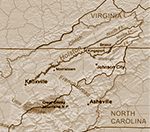 |
|||||
|
|||||
Carter Family |
|||||
|
John Carter was born about 1728. The Carter family moved from Virginia in the 1760's and John opened a trading post on the Holston River with William Parker. By 1772 they moved into the Watauga River Valley where John built a mansion. He was elected as a commisioner of the Watauga Association. In 1776 he signed the petition of Watauga settlers asking to become part of North Carolina. At the 1778 Washington County Court "the last will and testament of John Cox, decd., was duly proved by the oaths of Colonel Carter and Emanuel Carter, and the same to be recorded."
|
|
|||
John Carter was in the 1792 tax list of Washington County, Virginia. In October, 1810, John Carter divorced his wife, Catherine Blevins Carter. He said that "some time in the year 1792" he married Catherine and after about 10 years he began to suspect infidelity due to
He stated that he could
|
|
||||
|
Landon Carter was born on Janary 29, 1760 in Virginia. Carter County, Tennessee was named for him and its county seat, Elizabethton, was named for his wife. He married Elizabeth McLin on February 26, 1784. Elizabeth was born on July 9, 1765 in Virginia. Alfred Moore Carter (1784), Landon Carter was a captain in the American Revolution. He served under Colonel John Sevier and Colonel Arthur Campbell in 1780 and 1781. He was in the battle of Boyd's Creek and in an expedition against the Cherokee. Landon was a strong supporter of the State of Franklin and was secretary of the first Franklin convention. Landon Carter was on the 1792 and the 1794 Washington County, Virginia tax list in Captain Carriger's company. On November 7, 1796, Isaac Lincoln bought 94 3/4 acres from Landon. In 1800, Teter Nave bought 50 acres from Landon. Landon died on June 5, 1800 at Carter County. Elizabeth died in 1842 at Washington County, Tennessee.
|
|
|||
|
|||||
|
|||||
|
|||||
|
|||||
|
©Roberta Tuller 2025
|
|||||

